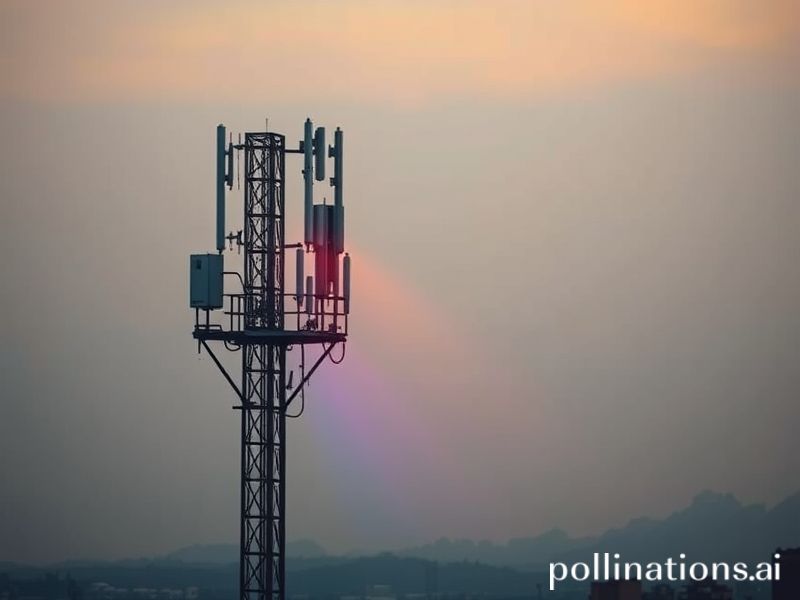Global Schadenfreude as Spectrum Flatlines: When America’s Internet Nap Becomes the World’s Anxiety Dream
Spectrum Down: When the World’s Digital Vein Flatlines and Humanity Re-enters Analog Hell
By our correspondent in Geneva, where the coffee is strong enough to reboot a continent
The outage began, as all modern catastrophes do, with a shrug emoji. From São Paulo stock traders to Seoul K-pop stans, users discovered that Spectrum—Charter Communications’ plump American broadband goose—had simply stopped laying golden data eggs. Screens froze on half-loaded doomscrolls. Zoom courts in Nairobi adjourned mid-bail hearing. In Warsaw, a crypto-bro screamed into the void (actually a dead Discord channel) as his leveraged Dogecoin position evaporated. Somewhere in rural Ontario, a grandmother’s smart insulin pump politely asked to speak with the cloud, then shrugged Gallically.
By minute 17, the outage had gone global in that uniquely twenty-first-century way: not because Spectrum runs the planet’s internet, but because everyone assumed it did. Hashtags in seven alphabets trended within seconds, each dialect adding its own cultural spice to the panic. Turkish users blamed coup plotters; Germans filed 847-page complaints before the routers even cooled; the French, ever elegant, simply shrugged—apparently they keep Minitel on retainer for exactly this scenario.
International finance, that jittery thoroughbred, reared first. Algorithmic traders in London’s Canary Wharf watched latency graphs flatline like a patient whose insurer just walked out. The pound dipped a polite 0.002%—not enough for headlines, but enough to nudge a Greek pension fund’s risk model into “sell olives, buy canned beans” territory. Meanwhile, in Singapore, container-ship schedulers discovered that their just-in-time empire floats on a brittle lattice of American cable. Who knew? (Answer: everyone in IT, but they were on vacation.)
Diplomatic cables—yes, the old-school kind that still get printed—buzzed with schadenfreude. Moscow’s English-language channels served warm borscht of “American digital hegemony crumbles,” while Beijing’s Global Times reminded citizens that the Great Firewall was, for once, a cozy blanket rather than a cage. The irony was not lost on anyone except the irony-detection servers, which were, of course, down.
Humanity’s regression was swift and oddly nostalgic. In Mexico City, taxi drivers produced laminated street maps the way Boy Scouts pull out Swiss knives. Rome’s cash-only trattorias suddenly looked prophetic rather than tax-evasive. And in Lagos, where generators already outnumber functioning traffic lights, startups pivoted to “analog coworking spaces” complete with typewriters and—this part is true—fax machines. One VC, high on generator fumes, declared the outage “a feature, not a bug” and raised pre-seed funding before dinner.
Back in the States, conspiracy theories bloomed like kudzu. QAnon influencers insisted the blackout was cover for a global elite switchover to adrenochrome-powered mesh networks; their livestreams glitched out mid-sentence, which only proved the point. Less imaginative citizens simply looted Starbucks for power outlets and existential Wi-Fi. National Guard units deployed to protect Spectrum technicians—an image future historians will file under “Late Empire, Symptoms of.”
Yet amid the chaos, certain constants reasserted themselves. Swiss trains ran on time because Swiss trains have never heard of Spectrum. Iceland’s entire population, already suspicious of anything warmer than a glacier, kept trading fish coins or whatever they use. And in Antarctica, researchers at McMurdo Station noted the outage with detached bemusement; they’ve been on “buffering” since 1999.
By hour six, redundancy kicked in—submarine cables rerouted, satellite links yawned awake, and the great beast of global commerce twitched back to life. Meme factories resumed production at 120% capacity to compensate for lost snark. Analysts calculated the economic damage at roughly one midsized Kardashian divorce settlement, which is either reassuring or horrifying depending on your 401(k).
The broader significance? A gentle reminder that the “cloud” is just someone else’s computer, usually parked in a humid Virginia strip mall. Our planetary nervous system has the redundancy of a chocolate teapot, and we’ve given it the keys to everything from pacemakers to presidential tweets. Humanity, having survived plagues, nukes, and disco, will doubtless survive this too—though next time the internet blinks, half the planet will assume it’s a personal slight and the other half will write a Substack about it.
Until then, keep a paper map, some cash, and perhaps a carrier pigeon. The bird may not stream Netflix, but at least it won’t ask for your billing zip code.







